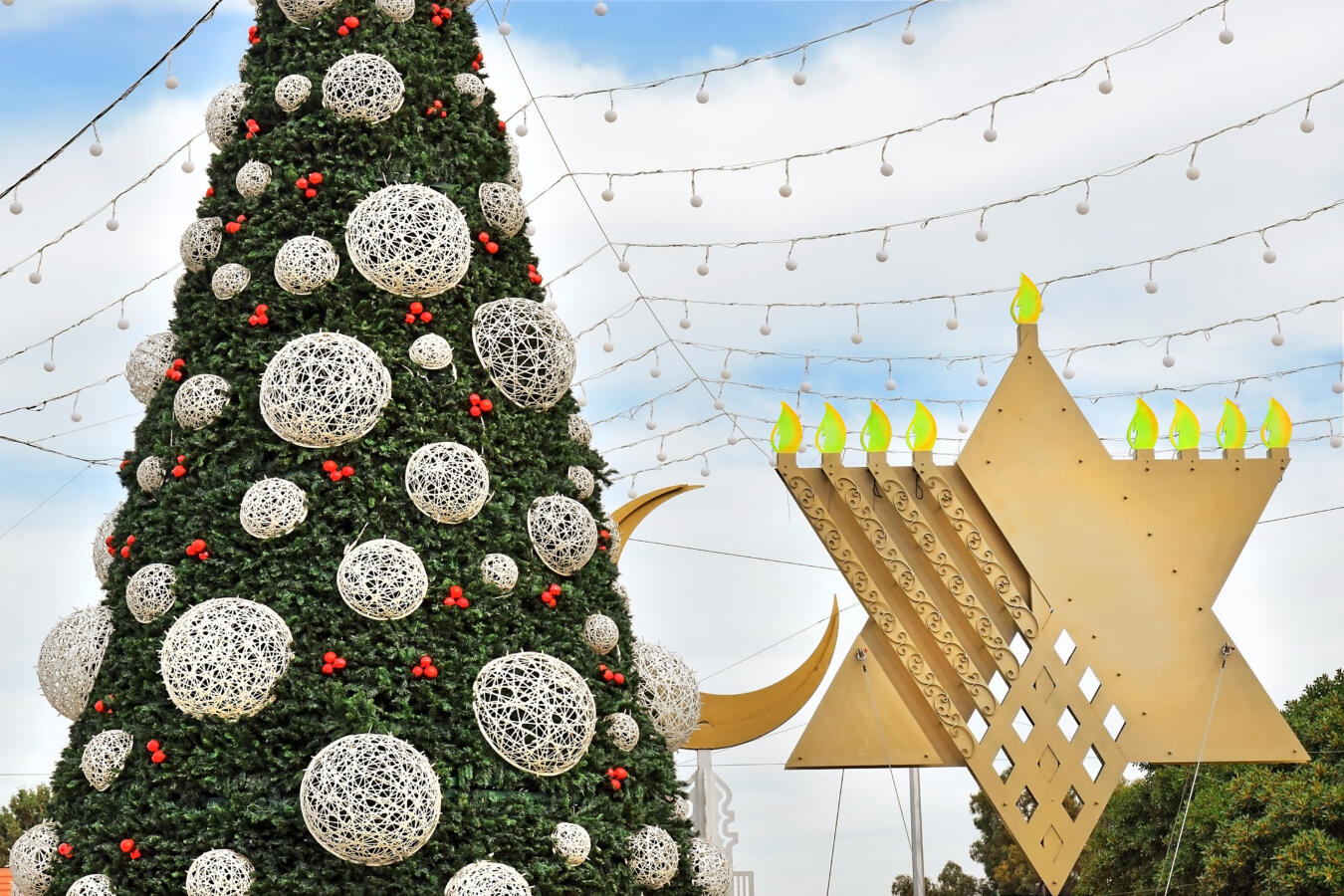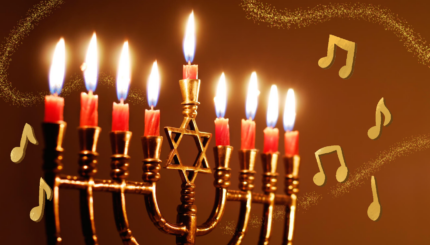It’s difficult to go about “business as usual” during the December holiday season. While the whole country appears to be celebrating, non-Christians often feel either trapped and marginalized if they don’t join the merriment, or they may feel disingenuous and even guilty if they choose to participate in Christmas observances.
Issues Faced by Interfaith Couples
For interfaith couples in which one partner is Jewish and the other identifies as Christian, the holidays of and Christmas pose opportunities and challenges. When children are not involved, couples frequently share their respective traditions and try out ways to observe the holidays together.
Many holiday practices can be shared without violating either partner’s religious integrity. Prior to having children, the vast majority of interfaith couples I’ve known over the years tell me that the December holidays are not especially problematic and can even be enjoyable times to share each other’s traditions.
When children are involved, however, the December holidays are more likely to be stressful. Couples often struggle over which holiday to observe or how the respective holidays will be celebrated. Even when the children are being raised as either clearly Jewish or Christian, questions may arise about celebrating the “other” holiday. Parents often ask if they will confuse their children.

Help us keep Jewish knowledge accessible to millions of people around the world.
Your donation to My Jewish Learning fuels endless journeys of Jewish discovery. With your help, My Jewish Learning can continue to provide nonstop opportunities for learning, connection and growth.
This issue surfaces most commonly when the children are being raised as Jews. Christmas observance can be perceived as a threat to their children’s Jewish identity and parents worry that others will question their commitment.
Parents’ ambivalence or difficulty in making decisions about children’s religious identity can lead to struggles between parents who try to attract children toward either religious tradition through holiday observances. Clearly, “letting the children decide” poses a real risk when Christmas and Hanukkah become competitions in which the number of presents is what matters most.
Some parents use holiday observances as a substitute for choosing a religious affiliation or education for the children. If parents have not decided on their children’s religious upbringing, Christmas or Hanukkah observance can send signals to others that the children are being raised as either Christians or Jews–whether or not that is the case.
Guidelines for Making the Holidays Family Celebrations, Not Battlegrounds
Interfaith parents can lessen tensions and enjoy the December holiday season by making a commitment that Christmas and Hanukkah will not become a battleground. The following guidelines can help parents negotiate the December dilemma.
Share childhood holiday memories. When partners understand the significance of various activities and symbolic objects, greater openness and creative ideas for incorporating the meaning in holiday observances may emerge.
Respect each other’s heritage. More than tolerance is needed to communicate acceptance of each parent’s tradition. Sincere appreciation for the meaning and richness of both Christmas and Hanukkah will help parents to teach children effectively and to choose activities as partners rather than as adversaries.
Communicate the real spirit of the holidays. For example, families can select charities or organizations and make a donation rather than buy extra gifts. Volunteering to help others in need teaches children about the value of social action rather than materialism.
Recognize each partner’s needs and work out ways to meet them. For example, one parent may wish to honor his or her heritage by having a holiday symbol at home or by visiting extended family. Denying this need will breed resentment, whereas, negotiating an acceptable plan recognizes the partner’s need.
Keep the focus on the children’s needs. Although parents’ needs are important, they should not overshadow those of the children.
Try using the analogy of a birthday party when both holidays are observed and children are being raised in one religion. Children can understand that everyone wants other people to share a birthday celebration. Parents can use this common experience to explain that the family is helping Mom or Dad to celebrate her or his holiday so it will be fun and not lonely, just like going to someone else’s birthday party. It can be fun to share even if it’s not your birthday party!
When possible, celebrate holidays with extended family. Grandparents in particular wish to share holiday traditions with their grandchildren. Even when children are not being raised in the grandparents’ religion, family celebrations can be avenues for relating, creating valued memories, and passing on traditions. Regardless of the specific holiday plans, “family togetherness” can result when the themes of inclusiveness and sharing overshadow those of competition and control.
Work as partners to develop new family traditions. Although it is easier to let others make the plans and do the work, creating ways to celebrate aspects of the holidays unites the family and avoids observing holidays vicariously through the grandparents.
Avoid making a competition out of the holidays. Parents who use presents to show children how wonderful “their” holiday is send the implicit message that it is better to identify with the religion associated with the most gifts.
Help children understand that they can enjoy Christmas and Hanukkah activities without betraying either parent or their religious upbringing. At the same time, use holidays to reinforce children’s religious identity. Even children ask each other, “Are you Christmas or Hanukkah?” Children want to be able to have a holiday of their own. If the family celebrates both holidays, help children answer questions with responses such as, “We have Hanukkah at home and visit my grandparents for Christmas” or “We do something for both Christmas and Hanukkah because my mom (or dad) is Christian (or grew up Catholic or Protestant, etc.) and my dad (or mom) is Jewish.”
December holidays come around every year. Negotiating ways to create family celebrations rather than struggles is worth the effort. Have a wonderful season this year!
Reprinted with permission from The Guide to Jewish Interfaith Family Life: An InterfaithFamily.com Handbook (Jewish Lights Publishing).
Explore Hanukkah’s history, global traditions, food and more with My Jewish Learning’s “All About Hanukkah” email series. Sign up to take a journey through Hanukkah and go deeper into the Festival of Lights.



